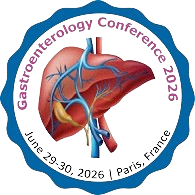Liver Cirrhosis and Complications
Liver cirrhosis, the advanced stage of chronic liver disease, is a major contributor to global morbidity and mortality. This session focuses on the pathogenesis, complications, and management of cirrhosis arising from various causes such as alcohol-related liver disease, chronic hepatitis B and C, and non-alcoholic steatohepatitis (NASH). Key complications—including portal hypertension, hepatic encephalopathy, variceal bleeding, ascites, and hepatocellular carcinoma—will be discussed with an emphasis on early recognition and intervention. The session highlights advancements in non-invasive diagnostic tools like transient elastography (FibroScan), serum fibrosis markers, and imaging techniques to assess liver fibrosis and function. Therapeutic strategies such as transjugular intrahepatic portosystemic shunt (TIPS), endoscopic band ligation, and targeted pharmacologic therapies will be explored. Multidisciplinary care models, nutritional support, and transplant evaluation protocols are vital in managing decompensated cirrhosis. By focusing on both prevention and comprehensive management, this session aims to improve patient outcomes and quality of life.
Related Conference of Liver Cirrhosis and Complications
20th World Congress on Gastroenterology -Therapeutics & Hepatology
Liver Cirrhosis and Complications Conference Speakers
Recommended Sessions
- Liver Cirrhosis and Complications
- Advances in Gastrointestinal Therapeutics
- Celiac Disease and Gluten-Related Disorders
- Colorectal Cancer: Prevention, Screening, and Treatment
- Endoscopic Innovations and Techniques
- Functional GI Disorders: IBS and Beyond
- Gastrointestinal Infections and Antimicrobial Resistance
- Gastrointestinal Oncology: From Screening to Targeted Therapies
- GI Oncology: Colorectal and Pancreatic Cancers
- Inflammatory Bowel Disease (IBD): Crohn’s and Ulcerative Colitis
- Inflammatory Bowel Disease (IBD): Insights and Advancements
- Liver Diseases and Hepatology
- Microbiome and Gut Health
- Non-Alcoholic Fatty Liver Disease (NAFLD) and NASH
- Pediatric Gastroenterology: Challenges and Innovations
- Peptic Ulcer Disease and H. pylori Infection
Related Journals
Are you interested in
- Advanced GI Endoscopy Techniques - Gastroenterology Conference 2026 (France)
- Advances in Gastrointestinal Oncology - WORLD GASTROENTEROLOGY 2026 (Spain)
- Advances in GERD Treatment - WORLD GASTROENTEROLOGY 2026 (Spain)
- Alcoholic Liver Disease Studies - Gastroenterology Conference 2026 (France)
- Alcoholic Liver Disease: Emerging Treatments - WORLD GASTROENTEROLOGY 2026 (Spain)
- Artificial Intelligence & Digital Health in GI - Gastroenterology Conference 2026 (France)
- Autoimmune Liver Disorders - Gastroenterology Conference 2026 (France)
- Bariatric Surgery & Obesity-Related GI Disorders - Gastroenterology Conference 2026 (France)
- Barrett’s Esophagus: Current Therapeutics - WORLD GASTROENTEROLOGY 2026 (Spain)
- Celiac Disease: Latest Treatment Options - WORLD GASTROENTEROLOGY 2026 (Spain)
- Cholangiocarcinoma Research - Gastroenterology Conference 2026 (France)
- Clinical Trials & Translational Research - Gastroenterology Conference 2026 (France)
- Digestive Health’s, Therapeutics & Diagnostics - Gastrosummit 2026 (UK)
- Emerging Therapies for Crohn's - WORLD GASTROENTEROLOGY 2026 (Spain)
- Endoscopic Ultrasound (EUS) & Advanced Imaging - Gastroenterology Conference 2026 (France)
- Endoscopists - Gastrosummit 2026 (UK)
- Endoscopy - Gastrosummit 2026 (UK)
- Esophageal Disorders: Current Treatments - WORLD GASTROENTEROLOGY 2026 (Spain)
- Gastroenterologists - Gastrosummit 2026 (UK)
- Gastroenterology - Gastrosummit 2026 (UK)
- Gastrointestinal - Gastrosummit 2026 (UK)
- Gastrointestinal Disorders: Clinical Updates - Gastroenterology Conference 2026 (France)
- Gastrointestinal Oncology - Gastroenterology Conference 2026 (France)
- Gastrointestinal Polyposis Syndromes - Gastroenterology Conference 2026 (France)
- Gastrointestinal Stromal Tumors: Novel Therapies - WORLD GASTROENTEROLOGY 2026 (Spain)
- Geriatric Gastroenterology & Liver Disorders - Gastroenterology Conference 2026 (France)
- GI Bleeding & Hemostasis Innovations - Gastroenterology Conference 2026 (France)
- GI Surgeons - Gastrosummit 2026 (UK)
- Global Health & Public Health Challenges in GI & Liver - Gastroenterology Conference 2026 (France)
- Gut Microbiome & Therapeutics - Gastroenterology Conference 2026 (France)
- Hepatic Encephalopathy: Modern Management Strategies - WORLD GASTROENTEROLOGY 2026 (Spain)
- Hepatitis C Therapeutics - WORLD GASTROENTEROLOGY 2026 (Spain)
- Hepatocellular Carcinoma & Liver Tumor Management - Gastroenterology Conference 2026 (France)
- Hepatocellular Carcinoma: Latest Approaches - WORLD GASTROENTEROLOGY 2026 (Spain)
- Hepatologists - Gastrosummit 2026 (UK)
- Inflammatory Bowel Disease (IBD) - Gastrosummit 2026 (UK)
- Inflammatory Bowel Disease Research - Gastroenterology Conference 2026 (France)
- Innovations in IBD Management - WORLD GASTROENTEROLOGY 2026 (Spain)
- Liver Cirrhosis: New Therapies - WORLD GASTROENTEROLOGY 2026 (Spain)
- Liver Disease: Chronic and Acute Management - Gastroenterology Conference 2026 (France)
- Liver Disorders - Gastrosummit 2026 (UK)
- Liver Transplantation Innovations - Gastroenterology Conference 2026 (France)
- Microbiome - Gastrosummit 2026 (UK)
- Microbiome and Gastrointestinal Health - WORLD GASTROENTEROLOGY 2026 (Spain)
- Minimally Invasive Gastrointestinal Surgery - Gastroenterology Conference 2026 (France)
- NAFLD and NASH Treatments - WORLD GASTROENTEROLOGY 2026 (Spain)
- New Approaches to Peptic Ulcer Disease - WORLD GASTROENTEROLOGY 2026 (Spain)
- Non-Alcoholic Fatty Liver Disease (NAFLD) & NASH - Gastroenterology Conference 2026 (France)
- Nutrition, Diet, and Lifestyle in GI & Liver Health - Gastroenterology Conference 2026 (France)
- Oncologists - Gastrosummit 2026 (UK)
- Oncologists - Gastrosummit 2026 (UK)
- Palliative Care & Quality of Life in GI & Liver Disorders - Gastroenterology Conference 2026 (France)
- Pancreatitis: Modern Therapeutic Strategies - WORLD GASTROENTEROLOGY 2026 (Spain)
- Pediatric and Adult Liver Metabolic Disorders - Gastroenterology Conference 2026 (France)
- Pediatric Gastroenterology & Hepatology - Gastroenterology Conference 2026 (France)
- Pharmacology & Novel Therapeutics - Gastroenterology Conference 2026 (France)
- Precision Medicine - Gastrosummit 2026 (UK)
- Precision Medicine & Biomarkers in Gastroenterology & Hepatology - Gastroenterology Conference 2026 (France)
- Public Health - Gastrosummit 2026 (UK)
- Rare GI & Liver Disorders - Gastroenterology Conference 2026 (France)
- Regenerative Medicine in Liver & GI Disorders - Gastroenterology Conference 2026 (France)
- Therapeutics for Biliary Diseases - WORLD GASTROENTEROLOGY 2026 (Spain)
- Ulcerative Colitis: Innovative Treatments - WORLD GASTROENTEROLOGY 2026 (Spain)
- Viral Hepatitis Research - Gastroenterology Conference 2026 (France)
- Viral Hepatitis: New Treatment Paradigms - WORLD GASTROENTEROLOGY 2026 (Spain)

